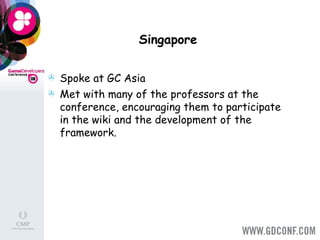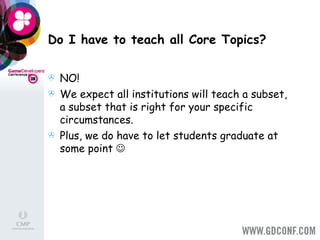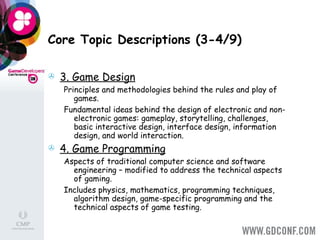Curriculumframework2008
- 2. IGDA Education SIG Overview March 2007 GDC - our 1st Academic Summit put together by the SIG April 2007 Boston August 2007 China September 2007 Singapore September 2007 Japan February 2008 GDC and release of new Curriculum Framework
- 3. 2007 SIG Academic Summit Sold out before early bird discount was over Great line-up of speakers (thanks Drew Davidson) ~400 people on the listserv prior to summit ~500 people on the listserv after the summit Meeting so many international academics, realize there is a huge need for outreach
- 5. April 2007 - Boston Was asked to speak at PoweringUp by the city of Boston Wondered, with so many schools in the metro area, who is working in games? 90 different professor at 15 different institutions thank you Harvard Interactive Media Group Grand Idea - let’s all collaborate Was really surprised Invited Linden Labs & Microsoft
- 6. China GDC China in Shanghai Traveled to Beijing, spoke at three schools a day (thank you GarageGames) One large lecture at the Communications School in Beijing- over 60 academics showed up to hear about the IGDA, the SIG and most importantly the Framework
- 8. Singapore Spoke at GC Asia Met with many of the professors at the conference, encouraging them to participate in the wiki and the development of the framework.
- 9. SIGGRAPH 2007 San Diego Opportunity to share our ideas cross communities Present our recommendations and curriculum framework Very full session with many faculty expressing interest in starting a new program at their institution Focused on our message
- 10. Relevant and Fundamental + Sheldon Glashow
- 11. 2008 IGDA Education Summit Audience requested we offer “Nuts & Bolts” of teaching games Thank you Derric Clark Two Tracks to address the issues of the entire membership Growth of the SIG ~600 people on the listserv prior to summit
- 12. What’s Next? Accreditation - IGDA Approved Education Chapters Institutional Affiliate Program Regional Programs Conference GDC Our Own Yearly Stand-Alone
- 13. IGDA Curriculum Framework The Study of Games and Game Development Magy Seif El-Nasr, Tracy Fullerton, Susan Gold, Darius Kazemi, Yusuf Pisan, Darren Torpey and many many volunteers who provided feedback and contributed materials. We are hoping that *you* will be one of the IGDA Education SIG volunteers for the next revision.
- 14. Our Goals Update the first Curriculum Framework (2003) A lot has happened in 5 years! Revisit and revise the original goals How many people have read the original 2003 Curriculum Framework? Distribute up to date information on current practices
- 15. Goals of the “Curriculum Framework” report Provide a conceptual guide to game-related educational programs Not a recipe book, but lots of ingredients! Describe knowledge areas & practical skills required Define a set of “Core Topics” List of areas for mixing and matching as that fits your institution
- 16. Who is the target audience? Educators and administrators developing curricula for games Games companies who want to know what they can expect from new graduates Students trying to find out their area of interest Professionals who are considering entering this field Public education organizations , government officials, accreditation bodies and others who want a deeper understanding of this area Anyone who is trying to make sense of games-related programs.
- 17. A bit of history (so we can maybe avoid repeating our mistakes) 2000 IGDA Special Education Group on Game Education formed Education Committee created to improve industry-academia communication and collaboration 2003 First version of the curriculum framework is released 2007 Collecting course outlines and degree descriptions on the wiki to guide next revision 2008 Curriculum Framework 2008 v3.2beta is released at GDC 2010/2011 Next version of the Curriculum Framework
- 18. Guiding Principles Shared Identity Develop a shared understanding of the field and communicate it to the society at large Fields of Study Outline areas, paint a useful pictures that transcends discipline boundaries Collaboration and Shared Vocabulary Establish industry-academia collaborations and shared vocabulary among developers/educators/students Theory and Practice Critical approach to game design & development. Theory feeding into practice, established best practice informing education Living Document Starting point for future work, not a final draft but a document that evolves with the field
- 19. Core Topics Critical Game Studies Games and Society Game Design Game Programming Visual Design Audio Design Interactive Storytelling Game Production Business of Gaming Many overlaps. Issues/subtopics can often be covered under different core topics
- 20. Do I have to teach all Core Topics? NO! We expect all institutions will teach a subset, a subset that is right for your specific circumstances. Plus, we do have to let students graduate at some point
- 21. But, aren’t there some topics that every game student should know, every program should teach? Yes, maybe, maybe not, …. Students need to specialize not just learn a bit of everything Students need to be able to communicate with experts outside their own field Currently, there is no agreed set of topics that every game student should learn. If there is ever an agreement on this, we will let you know
- 22. Are there any examples of existing programs? Yes, it is all on the IGDA wiki 100’s or course descriptions A bunch of degree descriptions Plus, you can add your own as you develop them! http://igda.org/wiki/Category:Courses http://igda.org/wiki/Category:Degrees
- 23. Core Topic Descriptions (1-2/9) 1. Critical Game Studies Criticism, Analysis & History of electronic and non-electronic games. Approaches from history, literature, media studies, and design. A key goal of is to develop and refine a critical vocabulary for articulating the aesthetics of games. 2. Games and Society Understanding how games reflect and construct individuals and groups, as well as how games reflect and are constructed by individuals and groups. Sociology, anthropology, cultural studies and psychology offer important insights into worldwide gaming culture
- 24. Core Topic Descriptions (3-4/9) 3. Game Design Principles and methodologies behind the rules and play of games. Fundamental ideas behind the design of electronic and non-electronic games: gameplay, storytelling, challenges, basic interactive design, interface design, information design, and world interaction. 4. Game Programming Aspects of traditional computer science and software engineering – modified to address the technical aspects of gaming. Includes physics, mathematics, programming techniques, algorithm design, game-specific programming and the technical aspects of game testing.
- 25. Core Topic Descriptions (5-6/9) 5. Visual Design Designing, creating and analyzing the visual components of games. Visual design fundamentals, both on and off the computer, across a broad range of media, history, analysis and production in traditional art media (such as painting, drawing and sculpture); communication fields (such as illustration, typography and graphic design); other design disciplines (such as architecture and industrial design); and time-based media (such as animation and filmmaking) 6. Audio Design Designing and creating sound and sound environments. Range of theoretical and practical audio-related areas, such as: music theory and history; music composition; aesthetic analysis of music; recording studio skills; and electronic sound generation. Audio relating specifically to digital game technologies, such as 3D sound processing and generative audio structures, is also included.
- 26. Core Topic Descriptions (7-8/9) 7. Interactive Storytelling Traditional storytelling and the challenges of interactive narrative. Traditional narrative theory, character development, plot, dialogue, back-story, and world creation, as well as experimental approaches to storytelling in literature, theatre, and film with relevance to games. 8. Game Production Practical challenges of managing the development of games. Games are among of the most complex forms of software to create, and game development and publishing are complex, collaborative efforts. Along with all the technical challenges of software development, issues of design documentation, content creation, team roles, group dynamics, risk analysis, people management, and process management are addressed.
- 27. Core Topic Descriptions (9/9) 9. Business of Gaming Economic, legal and policy aspects of games. The economics of the game industry – how games are funded, marketed and sold, and the relationships among publishers, developers, distributors, marketers, retailers, and other kinds of companies are addressed here.
- 28. You missed topic XXX!!! Yes. There might be topics we missed, there might be topics that are in fact not core and should not be included in this list. We do not claim that this list is complete or correct, but this was the best we could do (and we did agonize plenty). Help us improve this document by getting involved for the revision of the next version
- 29. What makes a great program? Here are some signs of a strong program. They may not make your program “great”, but they will strengthen your program. Advisory Board (local professionals if available) Focus on portfolio development (graduation requirement, professional/academic judges) Internship network with studios, companies and community organizations including non-profits. Relationship with local IGDA chapter (student memberships) Faculty with industry experience (especially for development-focused programs) Labs and libraries (access to hardware/software/games students don’t have) Speaker program (bring current professionals on campus) Mixed classes (courses involving programmers and artists on same project, team-based) Extracurricular projects (student-led mods, projects outside the classroom)
- 30. 2003 vs 2008 Bigger is Better (!?) Slightly longer (21 vs 34 pages), a bit more polished and easier to read Scope, goals, guiding principles articulated Document is slowly maturing Core Topics have not changed Expanded in detail Additional descriptions for each topic New Appendices Sample Degree Programs Sample Course Outlines (over 400 pages) Tied to IGDA Education wiki Add your own program and courses Books and other resources are on the wiki
- 31. Thanks to the many volunteers that made this document possible Mark Baldwin, University of Advancing Technology Katrin Becker, University of Calgary Robin Burke, DePaul University Philip Carlisle, University of Bolton Rob Catto, Full Sail Doug Church, Electronic Arts Jason Della Rocca, International Game Developer’s Association Mark Doughty, University of Lincoln Tom Dowd, Columbia College Michael Edwards, Parsons The New School for Design Clara Fernandez, Massachusetts Institute of Technology Tracy Fullerton, University of Southern California Paul Gadi, Anino Games Kimberly Gregson, Ithaca College Susan Gold Mark Harmon, Westwood College Online Ian Horswill, Northwestern University Robin Hunicke, Electronic Arts Katherine Isbister, Center for Computer Games Research IT University of Copenhagen Michael J. Katchabaw, The University of Western Ontario Jay Laird, Northeastern University Jack Lew, Electronic Arts Samuel Lewis, Cartoon Network Martin Masek, Edith Cowan University Bruce Maxim, University of Michigan-Dearborn Gary Miller, Full Sail Alex Mitchell, National University of Singapore Frans Mäyrä, University of Tampere Andrew Nealen, Technische Universitaet Berlin Lennart Nacke, Blekinge Institute of Technology Magy Seif El-Nasr, Simon Frasier University Casey O’Donnell, Rensselaer Polytechnic Institute Kevin O’Gorman, American InterContinental University Lisa Patacchiola Bristol Community College Yusuf Pisan, University of Technology, Sydney Mike Reddy Damon Redmond, Shaba Studios Norb Rozek, Frozen Code Base Studios Katie Salen, Parson the New School for Design, Institute of Play Ian Schreiber Marla Schweppe, Rochester Institute of Technology Warren Spector, Junction Point Studios Tom Smith, THQ Jolyon Webb, Blitz Games Elias Wyber, Murdoch University Catherine Wyman, DeVry Institute Eric Zimmerman, gameLab Yes, it is in tiny font!
- 32. What next? Read the IGDA Curriculum Framework document http://igda.org/education/ Contribute to the Curriculum Knowledge Base http://igda.org/wiki/Curriculum_Knowledge_Base Volunteer your time and expertise to IGDA Education SIG Additional information at IGDA web site: http://igda.org/ IGDA Game Education SIG: http://igda.org/education/ IGDA Game Education Wiki: http://igda.org/wiki/Game_Education_SIG IGDA Game Education Listserv: http://seven.pairlist.net/mailman/listinfo/game_edu
































